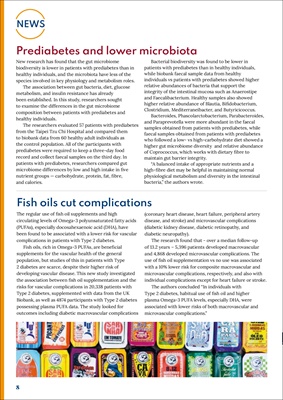
8
NEWS
Prediabetes and lower microbiota
New research has found that the gut microbiome
biodiversity is lower in patients with prediabetes than in
healthy individuals, and the microbiota have less of the
species involved in key physiology and metabolism roles.
The association between gut bacteria, diet, glucose
metabolism, and insulin resistance has already
been established. In this study, researchers sought
to examine the differences in the gut microbiome
composition between patients with prediabetes and
healthy individuals.
The researchers evaluated 57 patients with prediabetes
from the Taipei Tzu Chi Hospital and compared them
to biobank data from 60 healthy adult individuals as
the control population. All of the participants with
prediabetes were required to keep a three-day food
record and collect faecal samples on the third day. In
patients with prediabetes, researchers compared gut
microbiome differences by low and high intake in five
nutrient groups - carbohydrate, protein, fat, fibre,
and calories.
Bacterial biodiversity was found to be lower in
patients with prediabetes than in healthy individuals,
while biobank faecal sample data from healthy
individuals vs patients with prediabetes showed higher
relative abundances of bacteria that support the
integrity of the intestinal mucosa such as Anaerostipe
and Faecalibacterium. Healthy samples also showed
higher relative abundance of Blautia, Bifidobacterium,
Clostridium, Mediterraneibacter, and Butyricicoccus.
Bacteroides, Phascolarctobacterium, Parabacteroides,
and Paraprevotella were more abundant in the faecal
samples obtained from patients with prediabetes, while
faecal samples obtained from patients with prediabetes
who followed a low- vs high-carbohydrate diet showed a
higher gut microbiome diversity and relative abundance
of Coprococcus, which works with dietary fibre to
maintain gut barrier integrity.
"A balanced intake of appropriate nutrients and a
high-fibre diet may be helpful in maintaining normal
physiological metabolism and diversity in the intestinal
bacteria," the authors wrote.
Fish oils cut complications
The regular use of fish oil supplements and high
circulating levels of Omega-3 polyunsaturated fatty acids
(PUFAs), especially docosahexaenoic acid (DHA), have
been found to be associated with a lower risk for vascular
complications in patients with Type 2 diabetes.
Fish oils, rich in Omega-3 PUFAs, are beneficial
supplements for the vascular health of the general
population, but studies of this in patients with Type
2 diabetes are scarce, despite their higher risk of
developing vascular disease. This new study investigated
the association between fish oil supplementation and the
risks for vascular complications in 20,338 patients with
Type 2 diabetes, supplemented with data from the UK
Biobank, as well as 4874 participants with Type 2 diabetes
possessing plasma PUFA data. The study looked for
outcomes including diabetic macrovascular complications
(coronary heart disease, heart failure, peripheral artery
disease, and stroke) and microvascular complications
(diabetic kidney disease, diabetic retinopathy, and
diabetic neuropathy).
The research found that - over a median follow-up
of 13.2 years - 5,396 patients developed macrovascular
and 4,868 developed microvascular complications. The
use of fish oil supplementation vs no use was associated
with a 10% lower risk for composite macrovascular and
microvascular complications, respectively, and also with
individual complications except for heart failure or stroke.
The authors concluded "In individuals with
Type 2 diabetes, habitual use of fish oil and higher
plasma Omega-3 PUFA levels, especially DHA, were
associated with lower risks of both macrovascular and
microvascular complications."